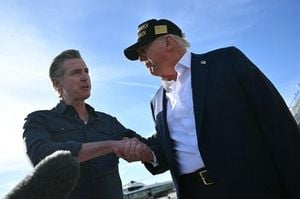Saudi Arabia is undergoing significant economic transformations as part of its Vision 2030 initiative, targeting diversification away from oil dependency and embracing sustainable investment practices. Major reforms and investments are slated for 2025, signaling the Kingdom's commitment to enhancing its economic framework.
At the forefront of this transition is Crown Prince Mohammed bin Salman, who recently emphasized, "We are committed to transforming our economy and embracing new technologies, driven by our ambitious vision for 2030." This statement encapsulates the Kingdom's bold approach to reshaping its economic future and aligning with global economic shifts.
With Vision 2030, Saudi Arabia aims to reduce its heavy reliance on oil revenues, which have historically dominated its economy. The Kingdom is actively seeking to create diverse job opportunities and attract foreign investments. The strategic focus for 2025 includes not just infrastructure improvements but also the establishment of modern regulatory frameworks to support innovation and entice international business partnerships.
The anticipated economic paradigm shift encompasses various sectors, including tourism, entertainment, and technology, with the government promoting initiatives intended to modernize the country's economic arsenal. Recent announcements indicate increased collaboration with multinational corporations, aiming to leverage their expertise and capital.
According to Bloomberg, one of the premier financial news sources, such collaborations will facilitate significant investment opportunities. Citing the Crown Prince's vision, the publication stated, "Investing in Saudi Arabia is not just about our resources, but about our people and future." This highlights the broader objective of not just economic growth, but creating human capital geared for contemporary market demands.
Throughout 2025, various forums and summits will bring together global investors and local stakeholders. These events will serve as platforms to showcase the nation's economic potential and the opportunities emanated by the reforms. The involvement of international investors is deemed pivotal for giving momentum to these ambitious goals.
Job creation remains at the heart of these developments, with officials projecting significant employment opportunities arising from the influx of foreign investment and the establishment of new industries. The Kingdom envisions these changes positively impacting local economies and generating substantial job growth.
While the economic reforms are ambitious, challenges abound. The global economic environment, marked by uncertainties, poses risks to the envisioned outcomes of these developments. Yet, the Saudi leadership appears undeterred and committed to facing these challenges head-on.
Economic analysts suggest these reforms could lead to long-term stability and growth, establishing Saudi Arabia as a formidable player on the global economic stage. The Kingdom's efforts to create a more diversified economy could facilitate consumption across various sectors and reduce its cyclic vulnerability to volatile oil prices.
With this endeavor, the future of the Saudi economy is poised for transformation, marking the Kingdom's emergence as more than just an oil powerhouse. The foundation set in 2025 could lead the way for sustainable practices, innovation, and the modern economic framework necessary for the 21st century.
Conclusion: Saudi Arabia's economic developments scheduled for 2025 represent not just immediate changes but the beginning of a long-term evolution. By embracing diverse sectors and attracting international partnerships, the Kingdom is taking significant strides toward securing its economic future.



